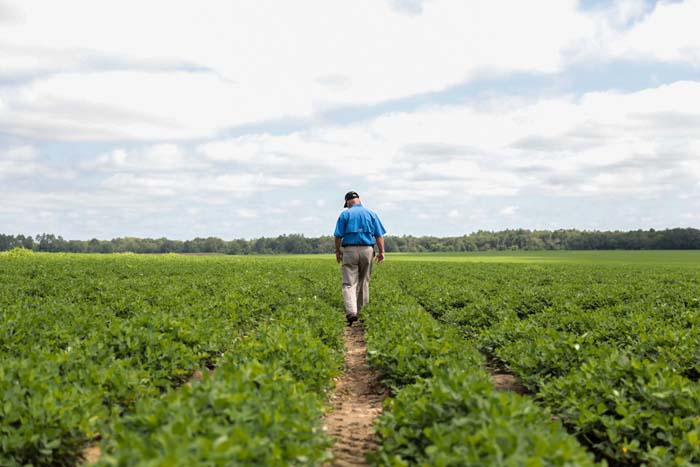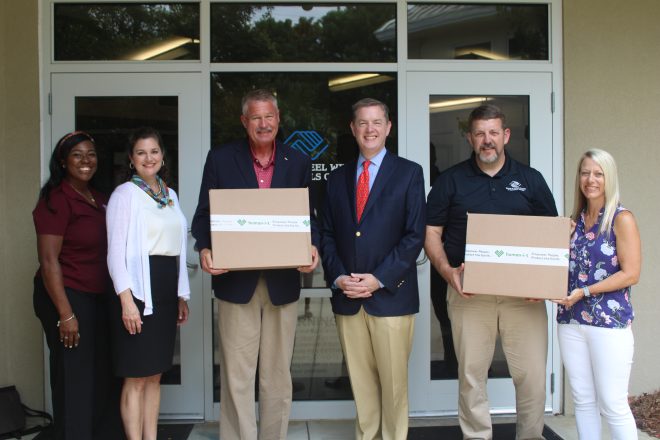Survey: 82% of farmers suffered financial loss due to COVID-19
Published 1:00 pm Wednesday, September 9, 2020

- Georgia Pecan Growers Association President Miley Adams walks through a field on peanuts on his farm in Camilla, Georgia.
ATLANTA — Georgia farmers have suffered substantial financial losses due to the COVID-19 pandemic.
Farmers and agribusiness experts knew that Georgia producers were suffering large revenue losses due to the pandemic but no one could point their finger on the extent.
A new impact study released this month by the University of Georgia Center for Agribusiness and Economic Development shows that 82% of farmers have seen revenue loss — those predicting an annual loss on average expected to be short nearly $50,000.
Conducted during the month of May, 862 Georgia farmers said they were experiencing weekly sales down by an average of $8,500 a week. The average annual farm income of respondents was $184,808 and farm acreage was 563.
The revenue losses may be even more dramatic today as the COVID-19 outbreak stretches into its seventh month, but agriculture leaders remain optimistic the industry will pull through.
Dr. Mark McCann, assistant dean for extension at UGA, said the pandemic has been unlike any other event to impact Georgia farmers.
While natural disasters — floods, droughts and hurricanes — are geographically restricted to impact only certain areas, he said, the pandemic has touched all corners of the Peach State.
“This is pervasive,” McCann told CNHI. “It affects all ag producers, regardless of size. … There’s very few people that miss being impacted.”
The livestock industry has been hit particularly hard, according to the report, seeing nearly half of the impact compared to other commodities.
McCann said in the early days of the virus, livestock sale barns across the state shuttered.
“When they close, there’s really not another option for the average small producer,” he said. “That’s their vehicle for sales.”
Department of Agriculture Commissioner Gary Black said the depression in prices in the livestock industry has created a big hole in the economy.
“They’ve rebounded a little bit,” he said, “but that’s still a problem for our beef producers.”
Poultry has also seen a decline in demand after hotels and fast-food restaurants abruptly closed their doors. As dairy production ramped up, business and schools no longer needed milk, and some dairy farmers had to pour their product down the drain.
Even as the economy has slowly begun to reopen, McCann said, nothing is operating at the numbers prior to the virus and demand likely won’t be back up to normal for quite some time.
When the survey was being conducted, the Paycheck Protection Program was the only pathway to federal relief for farmers — and only impacted those with payrolls and left small farmers without a lifeline.
Nearly 70% of farmers said they were not taking part in any relief program and only 22% were enrolled in a federal program, according to the report. More than three-quarters of the farmers surveyed responded that the federal programs did not provide sufficient relief.
Now, the first round of the USDA’s Coronavirus Food Assistance Program is coming to a close this week. So far, the federal government has distributed $9.7 billion in relief payments through the program. Of that, 10,700 Georgia applicants have received $131.5 million in relief.
Experts on the agriculture industry are not only concerned about the economic rebound, but the emotional toll the pandemic has taken on Georgia farmers.
While only 35% of farmers said they were very concerned with the emotional burden COVID-19 has put on their shoulders, McCann suspects the number is much higher.
“I think there’s more emotional stress than they attribute,” he said. “… Any kind of stress that they feel about the finances is going to bleed over into the personal side.”
A small livestock producer himself, McCann said he worries about farmers that have dealt with drought for the past few years or were hit hard by Hurricane Michael in 2018.
“This is just another stress, another economic fact that is laid over that,” he said.
Black said if farmers can make it to fall harvest without a large weather event, a good volume of produce will be there. But market prices are still low and some industries — such as Georgia’s pecan growers — are still in natural disaster recovery.
“When you look at market prices for almost every product, it is challenging at best,” he said. “… All of that is a very difficult burden for our producers to carry. So their emotional state is certainly troubling.”





